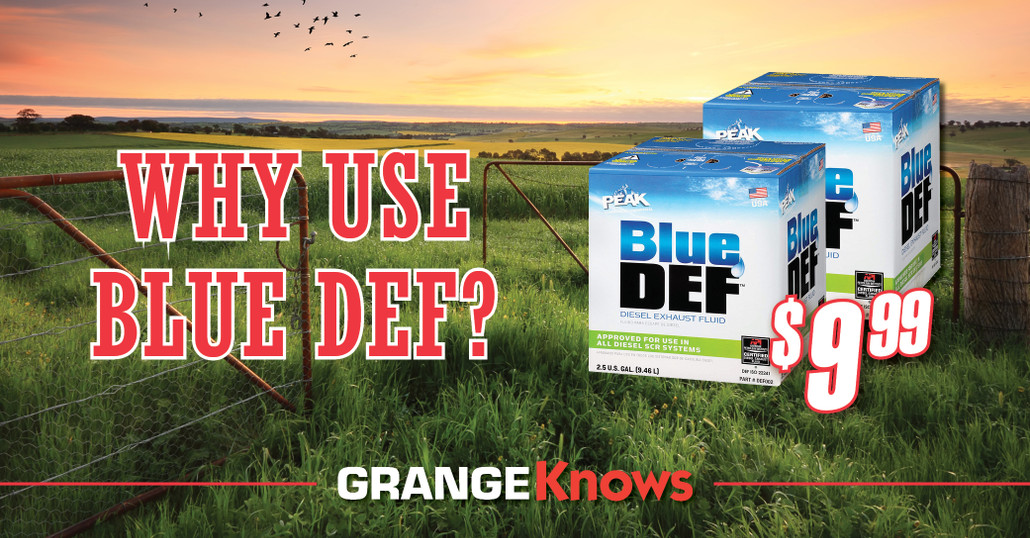
Diesel Exhaust Fluid Information and Usage
Posted by Grange Co-op on 29th Nov 2018
Since the introduction of diesel emissions legislation, truck manufacturers have sought to reduce emissions while maintaining and improving engine torque. This GrangeKnows article will cover Selective Catalytic Reduction (SCR) technology and the use of Diesel Exhaust Fluid (DEF) in diesel vehicles.
What is Diesel Exhaust Fluid (DEF)?
Diesel Exhaust Fluid (DEF) is a nonhazardous solution of carefully blended aqueous urea solution–32.5% high purity urea and 67.5% deionized water. Urea is a compound of nitrogen that turns to ammonia when heated. A small amount of DEF is sprayed into the exhaust stream of diesel vehicles to break down harmful oxides of nitrogen (NOx) emissions produced by diesel engines into safe
 nitrogen and water. DEF also improves fuel economy. DEF is not a fuel additive and does not come in contact with diesel because it is stored in a separate tank, typically with a blue filler cap. To break down emissions, many vehicles use a technology known as Selective Catalytic Reduction (SCR).
nitrogen and water. DEF also improves fuel economy. DEF is not a fuel additive and does not come in contact with diesel because it is stored in a separate tank, typically with a blue filler cap. To break down emissions, many vehicles use a technology known as Selective Catalytic Reduction (SCR).
What is (SCR)?
Selective Catalytic Reduction (SCR) is a system that can be found on 2010 and newer model year trucks and many diesel pickups and SUVs. SCR uses diesel exhaust fluid (DEF) and a catalytic converter to break down the NOx emissions through chemical reactions that require a constant feed of ammonia. In automotive applications SCR delivers the ammonia gas using a urea solution: diesel exhaust fluid (DEF).
When was Selective Catalytic Reduction (SCR) technology first used?
Selective Catalytic Reduction (SCR) technology was first patented in 1957 and has been used for many years to reduce NOx emissions from coal-fired plants and other stationary sources. It wasn’t until 2004 when Nissan Diesel in Japan first met emissions by implementing SCR in diesel vehicles. Popularity grew and by the end of 2012, more than one million commercial vehicles—in Europe alone—were equipped with SCR emissions control technology.
How much DEF will vehicles consume?
DEF consumption is measured as a ratio of diesel fuel use. Medium- and heavy-duty vehicles have a treat rate of approximately 2-3% depending on vehicle operation, duty cycle, geography, load ratings, etc. Meaning, if your truck has a fuel efficiency of six miles per gallon and treat rate (or also known as dosing rate) of 3%, it will use approximately 1 gallon of DEF every 200 miles.
What will happen if my truck runs out of Diesel Exhaust Fluid (DEF)?
Prior to running the DEF tank dry, all modern vehicles give owners plenty of notice that their DEF must be replenished. The frequency of warnings does vary, however if the DEF tank was left unchecked and completely emptied, the vehicle would refuse to start until the tank was once again filled.
Are there special storage requirements for DEF?
DEF should be stored in a cool, dry, well-ventilated area, out of direct sunlight. While the optimum storage temperature is up to 77 deg F (25 deg C), temporary exposure to higher temperatures has little to no impact on the quality of DEF.
Does DEF evaporate, and what happens if it does? 
Because diesel exhaust fluid is 67.5% water, if stored at higher temperatures for a prolonged period it does risk evaporation if the cap is not securely closed. But ensuring the cap is secured shut eliminates the risk of evaporation.
Should I be concerned about handling DEF?
DEF is a nontoxic, nonpolluting, non-hazardous and nonflammable solution. It is stable, colorless, and meets accepted international standards for purity and composition. DEF is safe to handle and store and poses no serious risk to humans, animals, equipment or the environment when handled properly. However, DEF is corrosive for some metals such as carbon steel, aluminum, copper and zinc, and DEF should not be stored in containers made of these materials.
Grange Co-op offers Blue DEF in smaller packaging options, including 2.5 gallon containers. Grange Co-op carries DEF that is certified by the American Petroleum Institute(API), German Institute of Standardization DIN70700, the International Organization for Standardization ISO 22241-1, and meets AUS - 32 specifications (this ensures the proper purity and concentration [32.5%] of urea). For more information on these specifications, visit www.iso.org.
If you have questions or need more information regarding DEF, visit one of our Grange associates at any of our stores.
